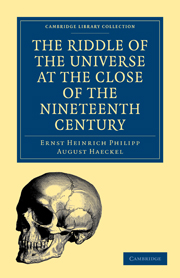Book contents
- Frontmatter
- Contents
- PREFACE
- AUTHOR'S PREFACE
- CHAPTER I THE NATURE OF THE PROBLEM
- CHAPTER II OUR BODILY FRAME
- CHAPTER III OUR LIFE
- CHAPTER IV OUR EMBRYONIC DEVELOPMENT
- CHAPTER V THE HISTORY OF OUR SPECIES
- CHAPTER VI THE NATURE OF THE SOUL
- CHAPTER VII PSYCHIC GRADATIONS
- CHAPTER VIII THE EMBRYOLOGY OF THE SOUL
- CHAPTER IX THE PHYLOGENY OF THE SOUL
- CHAPTER X CONSCIOUSNESS
- CHAPTER XI THE IMMORTALITY OF THE SOUL
- CHAPTER XII THE LAW OF SUBSTANCE
- CHAPTER XIII THE EVOLUTION OF THE WORLD
- CHAPTER XIV THE UNITY OF NATURE
- CHAPTER XV GOD AND THE WORLD
- CHAPTER XVI KNOWLEDGE AND BELIEF
- CHAPTER XVII SCIENCE AND CHRISTIANITY
- CHAPTER XVIII OUR MONISTIC RELIGION
- CHAPTER XIX OUR MONISTIC ETHICS
- CHAPTER XX SOLUTION OF THE WORLD-PROBLEMS
- INDEX
CHAPTER XVIII - OUR MONISTIC RELIGION
Published online by Cambridge University Press: 05 August 2011
- Frontmatter
- Contents
- PREFACE
- AUTHOR'S PREFACE
- CHAPTER I THE NATURE OF THE PROBLEM
- CHAPTER II OUR BODILY FRAME
- CHAPTER III OUR LIFE
- CHAPTER IV OUR EMBRYONIC DEVELOPMENT
- CHAPTER V THE HISTORY OF OUR SPECIES
- CHAPTER VI THE NATURE OF THE SOUL
- CHAPTER VII PSYCHIC GRADATIONS
- CHAPTER VIII THE EMBRYOLOGY OF THE SOUL
- CHAPTER IX THE PHYLOGENY OF THE SOUL
- CHAPTER X CONSCIOUSNESS
- CHAPTER XI THE IMMORTALITY OF THE SOUL
- CHAPTER XII THE LAW OF SUBSTANCE
- CHAPTER XIII THE EVOLUTION OF THE WORLD
- CHAPTER XIV THE UNITY OF NATURE
- CHAPTER XV GOD AND THE WORLD
- CHAPTER XVI KNOWLEDGE AND BELIEF
- CHAPTER XVII SCIENCE AND CHRISTIANITY
- CHAPTER XVIII OUR MONISTIC RELIGION
- CHAPTER XIX OUR MONISTIC ETHICS
- CHAPTER XX SOLUTION OF THE WORLD-PROBLEMS
- INDEX
Summary
Monism as a connecting-link between religion and science. The cultur-kampf. The relations of Church and State. Principles of the monistic religion. Its three-fold ideal: the good, the true, and the beautiful. Contradiction between scientific and Christian truth. Harmony of the monistic and the Christian idea of virtue. Opposition between monistic and Christian views of art. Modern expansion and enrichment of our idea of the world. Landscape-painting and the modern enjoyment of nature. The beauties of nature. This world and beyond. Monistic churches.
Many distinguished scientists and philosophers of the day, who share our monistic views, consider that religion is generally played out. Their meaning is that the clear insight into the evolution of the world which the great scientific progress of the nineteenth century has afforded us will satisfy, not only the causal feeling of our reason, but even our highest emotional cravings. This view is correct in the sense that the two ideas, religion and science, would indeed blend into one if we had a perfectly clear and consecutive system of monism. However, there are but a few resolute thinkers who attain to this most pure and lofty conception of Spinoza and Goethe. Most of the educated people of our time (as distinct from the uncultured masses) remain in the conviction that religion is a separate branch of our mental life, independent of science, and not less valuable and indispensable.
- Type
- Chapter
- Information
- Publisher: Cambridge University PressPrint publication year: 2009First published in: 1900



